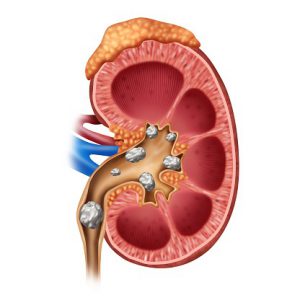Kidney stones (nephrolithiasis) are lumps of crystal made from substances found in urine. They typically build up along the inner surfaces of the kidney. The size of a kidney stone can range from as small as a grain of sand to as large as a golf ball. It is estimated, one in every twenty people will develop them at some point in their life.
Stones form when there is a decrease in the amount of urine produced, causing it to become highly concentrated and therefore allowing minerals to crystallize and stick together. There are four major types of stones, they include:
- Calcium stones
- Uric acid stones
- Struvite stones
- Cystine stones
While dehydration is a major contributor to the formation of kidney stones, some people are more prone to developing them than others. People with certain medical conditions such as gout or digestive diseases, those with a family history of kidney stones, as well as people who are obese or consume a diet rich in protein, sodium and sugar are more susceptible.
Kidney stones often go undetected until they become loose and travel along the urinary tract. When they move around the kidney or pass through the ureter, the following symptoms may occur:
- Pain during urination
- Pain along your side or back, below the ribs
- Urine that is pink, red or brown in color
- Pain in the lower abdomen or groin
- Difficulty urinating
- Frequent urination or urge to urinate
- Nausea or vomiting
- Cloudy or abnormal smelling urine
- Fever and chills
If these symptoms present themselves and persist it is advised that you see a doctor immediately. Your doctor may perform a series of tests that may include blood or urine tests, analysis of passed stones or abdominal x-rays to assess your condition. Depending on severity, treatment may include increasing your intake of water, pain medication or surgery.
All content of this newsletter is intended for general information purposes only and is not intended or implied to be a substitute for professional medical advice, diagnosis or treatment. Please consult a medical professional before adopting any of the suggestions on this page. You must never disregard professional medical advice or delay seeking medical treatment based upon any content of this newsletter. PROMPTLY CONSULT YOUR PHYSICIAN OR CALL 911 IF YOU BELIEVE YOU HAVE A MEDICAL EMERGENCY.

